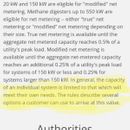About Net Zero
I live in Michigan. I have solar panels that supply most of my electric needs, with easy expansion capabilities. As electricity is necessary for me at all times (I live in an area with a high water table and a sump), so far I have remained grid-tied and have a whole-house automatic propane generator for outages.
I could easily supply all the electricity I need, but I’m limited by an MPSC (Michigan Public Service Commission) ruling that says I can’t make any more than I can use over a one-year period. The electric company, Consumers Energy, has informed me that, if I ever exceed that limit, I will be immediately disconnected from the grid.
With that in mind, it appears that having a “Net Zero” home is impossible in this state without going off-grid and using an extensive battery storage system. Is this only a Michigan problem? Is there any way around it? Suggestions?
GBA Detail Library
A collection of one thousand construction details organized by climate and house part











Replies
Lynn,
Perhaps I misunderstand the limitation in Michigan. But if your description is accurate, you are allowed to install a PV system that is sized to produce as much electricity on an annual basis as you consume.
Of course it's hard to hit the nail exactly on the head, but assuming you make a good faith effort to size the PV system appropriately, and assuming your calculations are accurate, then you have, by definition, a net zero house.
If you fall 3% short of your goal, who cares? And if you produce 103% of your annual needs instead of 100%, I assume you will get no credit for the excess electricity production -- but I can't imagine that the Michigan State Police will raid your home and arrest your for excess electrical production.
Did you get the disconnection threat for exceeding annualized Net Zero in writing? Can you point to the specific MPSC ruling that dictates what happens when there is an excess?
I'm skeptical that it would be legal for the utility to disconnect you for an excess on annual net ENERGY use, but inclined to believe they could disconnect above some level of instantaneous POWER being exported.
According to the state of Michigan's website (http://www.michigan.gov/mpsc/0,4639,7-159-16393_48212_58124-253269--,00.html), for <20 kw projects:
“净计量信用过剩代carry forward indefinitely."
Reads to me that rather than getting your cord clipped for the crime exporting 1kwh more than you used, you can go ahead and over-build the PV and build up a kwh credit over several years, then eventually work down that credit when you buy an electric vehicle.
The two net metering classes discussed in your attached scanned document are <150kw, but even a 20kw array would exceed the power use of all but the largest single family home's energy use (unless only heating with resistance electricity in a sub-code house.)
Consumer Energy's online brochure (https://www.consumersenergy.com/~/media/CE/Documents/renewables/net-metering/net-metering-everything-you-need-to-know.ashx?la=en) doesn't discuss disconnection for over-producing.
"How much electricity as a Net Metering customer am I able
to produce?
That depends on your electricity needs. The Net Metering program is intended
only to offset your annual electricity use, and therefore your renewable energy
system’s annual generation cannot exceed your annual electricity use. You can
find your annual use by adding up the previous 12 months of electricity use
from your electric bill."
So they MAY be able to refuse to connect an expansion that will obviously and grossly exceed your current annual use. But you could could probably argue that your planning to buy an electric vehicle and still get connected before you buy the vehicle, if you also installed the charger.
Disconnection for net-positive annualized energy export would be a pretty extreme measure, one that could result in some major legal (and MAJOR public relations) liabilities on the utility's end.